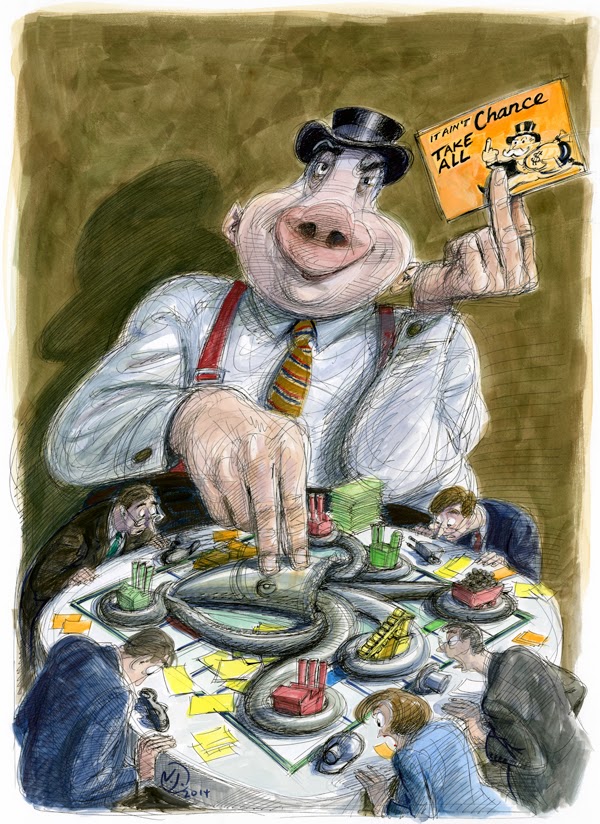The Vampire Squid Strikes Again: The Mega Banks' Most Devious Scam Yet
Feb 12, 2014 | Rolling Stone | Matt Taibbi
Call
it the loophole that destroyed the world. It's 1999, the tail end of
the Clinton years. While the rest of America obsesses over Monica
Lewinsky, Columbine and Mark McGwire's biceps, Congress is feverishly
crafting what could yet prove to be one of the most transformative laws
in the history of our economy – a law that would make possible a broader
concentration of financial and industrial power than we've seen in more
than a century.
But the crazy thing is, nobody at the time quite knew it. Most
observers on the Hill thought the Financial Services Modernization Act
of 1999 – also known as the Gramm-Leach-Bliley Act – was just the latest
and boldest in a long line of deregulatory handouts to Wall Street that
had begun in the Reagan years.
Wall Street had spent much of that era arguing that America's banks
needed to become bigger and badder, in order to compete globally with
the German and Japanese-style financial giants, which were supposedly
about to swallow up all the world's banking business. So through
legislative lackeys like red-faced Republican deregulatory enthusiast
Phil Gramm, bank lobbyists were pushing a new law designed to wipe out
60-plus years of bedrock financial regulation. The key was repealing –
or "modifying," as bill proponents put it – the famed Glass-Steagall Act
separating bankers and brokers, which had been passed in 1933 to
prevent conflicts of interest within the finance sector that had led to
the Great Depression. Now, commercial banks would be allowed to merge
with investment banks and insurance companies, creating financial
megafirms potentially far more powerful than had ever existed in
America.
All of this was big enough news in itself. But it would take half a
generation – till now, basically – to understand the most explosive part
of the bill, which additionally legalized new forms of monopoly,
allowing banks to merge with heavy industry. A tiny provision in the
bill also permitted commercial banks to delve into any activity that is
"complementary to a financial activity and does not pose a substantial
risk to the safety or soundness of depository institutions or the
financial system generally."
Complementary to a financial activity. What the hell did that mean?
"From the perspective of the banks," says Saule Omarova, a law
professor at the University of North Carolina, "pretty much everything
is considered complementary to a financial activity."
Fifteen years later, in fact, it now looks like Wall Street and its
lawyers took the term to be a synonym for ruthless campaigns of world
domination. "Nobody knew the reach it would have into the real economy,"
says Ohio Sen. Sherrod Brown. Now a leading voice on the Hill against
the hidden provisions, Brown actually voted for Gramm-Leach-Bliley as a
congressman, along with all but 72 other House members. "I bet even some
of the people who were the bill's advocates had no idea."

No comments:
Post a Comment